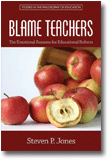
Blame Teachers
The Emotional Reasons for Educational Reform
By:
Steven P. Jones, Missouri State University
A volume in the series: Studies in the Philosophy of Education. Editor(s): John E. Petrovic, The University of Alabama.
Published 2015
There is a story going around about the public schools and the people who teach in them—a story about how awful our nation’s teachers are and why we should blame teachers for the poor state of our public schools. But is the story about teachers right or fair? Why do so many people point fingers at teachers and seem to resent them so much?
Blame Teachers: The Emotional Reasons for Educational Reform examines why many people blame teachers for what they understand to be the poor state of our schools. Blame comes easily to many people when they read about poor student performance and how “protected” teachers are by teachers’ unions and tenure policies. And with blame comes resentment, and with resentment comes demands for all kinds of educational reform—calls for more standardized testing, merit pay, charter schools, and all the rest. And we expect teachers to like and accept all the reforms being proposed.
Conceiving educational reform out of blame and resentment aimed at teachers does no good for teachers, students, or schools. Blame Teachers outlines many of the strange and unacceptable assumptions about teaching and the purposes of education contained in these educational reforms. Intended for teachers, teacher education students, policymakers and the larger public, Blame Teachers suggests much better and more productive conversations we can have with teachers—conversations much more likely to improve teaching and learning in classrooms. The book argues for conversations with teachers that don’t begin or end with blame and resentment.
In this lively, personal meditation on what it means to be a teacher, Steven Jones demonstrates how an emotional, unreasoned ‘blame game’ directed at teachers by educational reformers today is undercutting the future of the nation’s children. It is doing so by threatening to deprive them of teachers as contrasted with by‐the‐numbers technicians. Today’s reformers neglect the philosopher Spinoza’s time honored insight, that a person in the grip of emotion is “in human bondage” and simply cannot see the truth of things. Can educators themselves, in tandem with knowledgeable members of the public, transform the reformers’ dogmatic, harmful narrative about our teachers? Jones’ thoughtful study will surely help in this much‐needed effort. ~ David T. Hansen, Weinberg Professor in the Historical and Philosophical Foundations of Education, Teachers College
CONTENTS
Justifying Reforms and Changes to the Teaching Profession. Blame and Resentment. Blame, by Any Other Name. Those Who Can’t, Teach. Standards, Accountability, and the Value of Learning. Teachers: Guilty as Charged. Giving Students Good Reasons to Learn. Don’t Blame Teachers
REVIEWS
"Cultural shifts over the last half century have left educators vulnerable to myriad attacks from the public, politicians, and corporate entities. Battles over the means, methods, and efficacy of education, which manifest in debates over curriculum, funding, and assess-ments, limit and in some cases imperil educators’ efforts to facilitate learning. Jones (2015) levels reasoned, insightful criticisms at those who seek to restrict teachers’ praxes and abolish protections such as tenure which allow them to carry out research and expand pedagogy. The author’s useful text staunchly defends the teaching profession and exposes the mendacity of education leaders such as Arne Duncan and the detrimental effect neolib-eralism has had on the profession, primarily in charter schools. The text behooves educa-tors and those preparing to enter the field to guard themselves against cultural and politi-cal threats to the profession and to decode the language used to vilify and dismantle edu-cation in its truest sense." Jarrett Neal Aurora University in Critical Questions in Education (Read full review)
-
Paperback978-1-68123-218-8
Web price: $45.04 (Reg. 52.99)
-
Hardcover978-1-68123-219-5
Web price: $80.74 (Reg. 94.99)
- eBook978-1-68123-220-1

- EDU000000 - EDUCATION: General
- EDU034000 - EDUCATION: EDUCATIONAL POLICY & REFORM: General
- EDU037000 - EDUCATION: Research
-
 Conceptualizing Truth
Implications for Teaching and Learning
Conceptualizing Truth
Implications for Teaching and Learning
-
 Dystopia & Education
Insights into Theory, Praxis, and Policy in an Age of Utopia-Gone-Wrong
Dystopia & Education
Insights into Theory, Praxis, and Policy in an Age of Utopia-Gone-Wrong
-
 Love in Education & the Art of Living
Love in Education & the Art of Living
-
 Problematizing the Profession of Teaching from an Existential Perspective
Problematizing the Profession of Teaching from an Existential Perspective
-
 Teaching is a Human Interaction
How Thoughtful Educators Respond, Are Responsive, and Take Responsibility
Teaching is a Human Interaction
How Thoughtful Educators Respond, Are Responsive, and Take Responsibility
-
 Technologies of Government
Politics and Power in the "Information Age"
Technologies of Government
Politics and Power in the "Information Age"
-
 The Fear Problematique
Role of Philosophy of Education in Speaking Truths to Powers in a Culture of Fear
The Fear Problematique
Role of Philosophy of Education in Speaking Truths to Powers in a Culture of Fear

